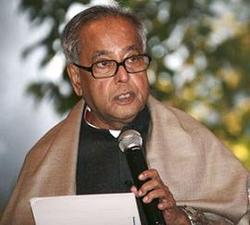 After the announcement of CPM’s support for Incumbent Finance Minister of India, Pranab Mukherjee in Presedential election, it is now almost clear that he will become the head of state in the last week of July. So this is the right time to explore and know more about Pranab Mukherjee. He was also briefly considered for the post of President in 2007 but in the end his name was subsequently dropped after his excellent contribution in the Union Cabinet was considered practically indispensable. Currently besides being the Finance Minister, Mr. Mukherjee is a senior member of many Cabinet Committees and heads some of the important Group of Ministers Committees. He has been a member of the Board of Governors of the International Monetary Fund, of the World Bank, of the Asian Development Bank, and of the African Development Bank. He is also the senior member of the Congress Working Committee (CWC).
After the announcement of CPM’s support for Incumbent Finance Minister of India, Pranab Mukherjee in Presedential election, it is now almost clear that he will become the head of state in the last week of July. So this is the right time to explore and know more about Pranab Mukherjee. He was also briefly considered for the post of President in 2007 but in the end his name was subsequently dropped after his excellent contribution in the Union Cabinet was considered practically indispensable. Currently besides being the Finance Minister, Mr. Mukherjee is a senior member of many Cabinet Committees and heads some of the important Group of Ministers Committees. He has been a member of the Board of Governors of the International Monetary Fund, of the World Bank, of the Asian Development Bank, and of the African Development Bank. He is also the senior member of the Congress Working Committee (CWC).
- He belongs to a Bengali Hindu Kulin Brahmin family. His father Kamada Kinkar Mukherjee was also member of Congress party and West Bengal Legislative Council, and President, District Congress Committee, Birbhum.
- He attended the Suri Vidyasagar College, Suri (Birbhum), then affiliated with the University of Calcutta and completed Master of Arts degrees in History and Political Science. In 2011 he was awarded an honorary Doctor of Letters degree by University of Wolverhampton.
- Mr. Mukherjee began his career as a college-teacher and later as a journalist. He worked for noted Bengali publication Desher Dak (Call of Motherland). He also became trustee of Bangiya Sahitya Parishad and later President of Nikhil Bharat Banga Sahitya Sammelan.
- Mukherjee was a Minister in Indira Gandhi’s Cabinet during the infamous Emergency and was held by many to be personally responsible for some of the excesses. He was summoned before the Shah Commission but followed Mrs. Gandhi’s lead in refusing to resign before it. A police case was registered against him which was withdrawn when Mrs. Gandhi returned to power.
- Very few people know that he was Finance Minister when Rajiv Gandhi was our Prime Minister. He is one of the most senior leaders of Congress Party. He has a parliamentary career of over four decades, which began as a member of Rajya Sabha (upper house) from the Congress Party in 1969; he was re-elected in 1975, 1981, 1993 and 1999. In 1973, he joined the cabinet as Union Deputy Minister, Industrial Development. He rose through a series of cabinet posts to become the Finance Minister of India from 1982 to 1984.
- After Indira Gandhi’s assassination in 1984, he tried to become the Prime Minister but failed due to popular support for Rajiv Gandhi. As a result of this revolt he was pushed out of the Congress party for a brief period, and during this period he formed his own political party Rashtriya Samajwadi Congress, but later merged it with Congress party in 1989 after settlement with Rajiv Gandhi.
- In 1991 P.V. Narasimha Rao appointed him as deputy chairman of the planning commission and subsequently as a union cabinet minister. He served as External Affairs Minister for the first time from 1995 to 1996 in Rao’s cabinet. In 1997 he was voted Outstanding Parliamentarian.
- In 2004, when the Congress formed a government at centre, the new Congress Prime Minister Manmohan Singh was only a Rajya Sabha MP. So Pranab Mukherjee was made Leader of the House in the Lok Sabha when he won the Lok Sabha elections for the first time from Jangipur (Lok Sabha constituency).
- Pranab Mukherjee is very well respected in Indian politics. People describe him as having “a reputation as a number-crunching politician with a phenomenal memory and an unerring survival instinct.”
- His one of the biggest achievements as the Foreign Minister was the successful signing of the U.S.-India Civil Nuclear Agreement with the US government and then with the Nuclear Suppliers Group, allowing India to participate in civilian nuclear trade in spite of not having signed the Nuclear Non-Proliferation Treaty.
